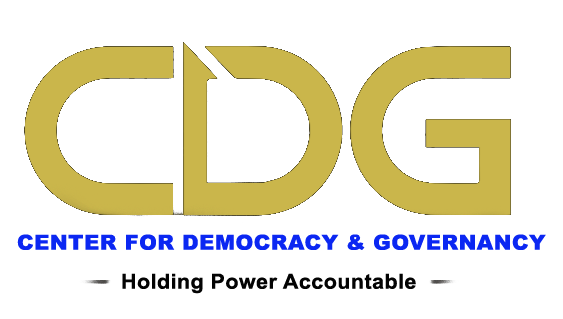BACKGROUND:
The Center for Democracy and Governance in Somaliland (CDG) held a two days’ workshop on 8th and 9th April 2020 in Buhoodle, Somaliland. The Center’s field offices’ staff about Peace-Building and Governance department pioneered the initiative. The workshop was part of the Center’s project, “Community Consultation on traditional leadership and Community-based consolidation of Peace in the region”, which is run in collaboration with the local community engagement for peaceful and stable society.
Under the supervision of workshop was led by Abdirahman Warsame and the facilitator of the workshop Abshir Hassan the ground technical person. The project focuses on encouraging effective social participation in the peace process, engagement of key community stakeholders in finding lasting solutions to drivers of insecurity.
CDG has been cooperating with Somaliland and remote regions and districts where political neglect, resources conflict, cross border struggles have resulted in insecurity and safety of countries, Djibouti, Somaliland, and Somalia. In Togdheer this is a common phenomenon. Legislation, local participation, capacity building, conflict resolution and broader development interventions are required but broader assessment on the ground was identified as critical and CDG is working on this.
Buhoodle is one the harsh climate affected areas in Somaliland and has historically been less inhabited and as such disregarded in its economic development potential. This is wrong perception of the area. The story is different according to ground assessment and engagements held in a snapshot by CDG. Development policy and local governance needed to refocus dialogue mechanisms for effective solution to peace and development. When people are neglected they become a safe haven for opportunist groups and stability is disrupted. Youth, women and elders remain disgruntled and so breeding a vacuum that destroys trust in the political leadership. The development project count in terms of livelihood assets protection, distribution and consolidation of unity safety and security have recorded low in the region and thus support to national initiatives deteriorated.
Objectives:
- Meeting the community leadership as patrons of the peace in the areas and any peace process;
- Covering the gaps in community development of the area
- Identifying Community assets for development and peace in the area;
- Mapping international development projects needed for community development according to gaps in (2) above.
- Preparing for the mapping for future national and cross border issues affecting Buhoodle and countries sharing borders across the region which have remained so unstable;
Methods used:
- Held meeting with leaders
- Running dialogue forums/sessions for interested groups especially women and youth;
- Publishing a report of recommendations;
- Hosting discussions with influential business people on peace process;
- Sharing information with local NGOs
- Holding two days’ workshop with Buhoodle influential leaders and groups







Following the stages above we held a workshop for 2 days and participants were
- Tradition leaders of the existing clans-(15)
- Religious leaders-(5)
- Women-(20)
- Youths-(10)
- Business people-(5)
- Local non-government organizations-(5)

The objective of the workshop was to establish mutual understanding between the trainees and CDG staff facilitating the consultation workshop around the topics of violence, conflict, society and the peace process. We covered the critical issues affecting peace and stability as well as existing peace assets to consolidate.
It also taught them the skills for peace-building, for dialogue management and for dealing with people affected by the conflict. The participants were particularly interested in the safety and security of civilians during the conflict as pursued by the staff of the effective NGOs and government representatives organized by CDG.
The team aims at training leaders to better represent their communities and encouraging the rational procedures in any hierarchical peace process by promoting the idea of horizontal and vertical collaboration to support the development of peace-building resources and to establish a unified manifesto for the Somalia, Djibouti, Somaliland and natives of Buhoodle Simultaneously.


Based on the project’s objectives, as well fresh ideas brought to the workshop, the trainees were divided into groups to explore the core issues involved in each sector. In order to aid these discussions, the project manager talked about the project’s mission and how it relates to the various levels of the peace-building process. The project manager helpfully identified the first level as influential international and regional groups working in Buhoodle as well as major internal organizations. The second level included clerics and civilian interest groups/ organizations while the third level is made up of the people of Buhoodle


During the workshop, the discussions turned to how to establish feedback sessions for the three levels of the peace process. It was agreed;
That supplying those involved in the peace process with high quality information about the facts on the ground.
The views of local leaders was essential for the success of the peace process. Without such information, the negotiations would run the danger of neglecting specific concerns or the issues that affected ordinary people that could potentially cripple any settlement agreed upon and development of the areas especially border communities in Togdheer.
The groups agreed that one way in which this could be achieved is to hold small panel discussions that effectively served the role of focus groups. Another method would be to conduct key reviews of peace resources – especially those that connected the three levels of the peace process together.
The discussion then turned to the challenges that the project may face, for example a lack of information leading to the community and development programs being misunderstood, and the risks posed to the project’s success, such as the substantial threat posed to it by the armed conflict and the presence of extremist organizations.
The workshop was a great success and those involved have gone away with a greater understanding of the Community-based peace project’s/workshop’ direction and what needs to be done to see it succeed. The group exercise was particularly enlightening for it allowed the trainees to better understand various opinions and philosophies that exist between different sections of people and organization that are now living or working in Buhoodle. Importantly, they go away with the skills to better facilitate and manage discussion sessions and how to submit topics and propose questions to round table community discussions and in interviews.
Way forward:
-The Elder, clerics and interest groups are ready and willing to welcome local and international development actors committed to establishment of peace for development.
-Peace building initiatives in the region are welcome and community is ready to cooperate
-For anything which causes insecurity community expressed need for national and regional support for example clan conflicts, conflict on survival assists and shared livelihood resources protection.
-They feel neglected and if any opportunistic establishments/groups take the vacuum it will be disaster for the region and countries.
-Community development projects are necessary to employ young people and cultivate a sense of responsibility to stability and peace, directing regional resources to the right cause and foster development of the region that is rich, but poverty ridden because of neglect.





